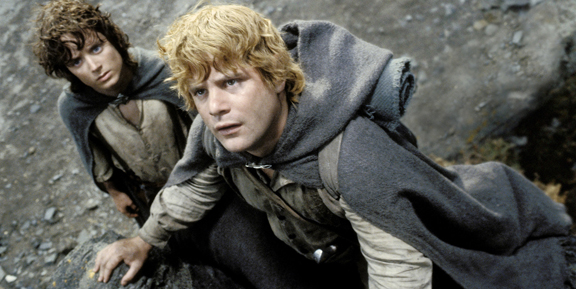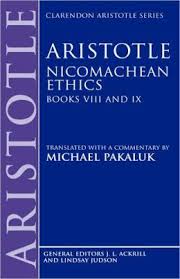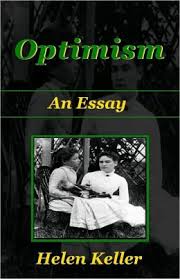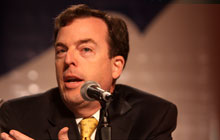In contrast to the somewhat idealistic view of the Optimist is the view of Realism, whose proponents desire to both “believe” and be “real.” This position, developed in the 20th century by theologian Reinhold Niebuhr and popularized in particular by the writings of J.R.R. Tolkien, states that because we are fallen people who unceasingly revert to injustices in this world, the ideal of the kingdom of heaven cannot be attained here on earth. Instead it must be moderated to a position of realism, where we seek the greatest good, even in the midst of the really bad.
The reason great literature of the past still appeals to us is that it addresses those timeless virtues and vices that are common to all men. The same themes of sin and redemption, of purpose and meaning, of choosing right or wrong, thunder across the ages. Tolkien places this view in the mouth of Sam Gamgee at the end of The Return of the King when Sam asks Gandalf, “Is everything sad going to come untrue? What’s happened to the world?” Sam is expressing not just the hope of all people, that all good things come true, but the common Christian idea of even the bad becoming “untrue.” While acknowledging the brokenness and the influence of evil in the present age (the cause of war, disease, lust, pride and envy), the Realist also carries with him the enduring and abiding hope that everything sad will “come untrue.”
In the following article, one writer demonstrates how Realism is still a “real idea” even in these “terrifying times.”
Recovering Christian Realism in “Terrifying Times”
By Robert Joustra (Source)
In “Terrifying Times,” John Oliver tells us that times have gotten so bad that this year on the Harvard Business School examination there’s only one question:
Kenya has three apples.
America wants those apples.
How many apples does Kenya have?
It’s multiple choice, and there’s one answer: a) Kenya has no apples.
Many people have an experience of global politics that oscillates between this profound, nearly nihilistic cynicism and a youthful, engaged optimism. These gut reactions have been captured in two of the oldest and most enduring schools of thought in international politics: realism and idealism. For the thinking Christian, these are tough choices; our experience of brokenness and sin tells us that realists have a corner on some important truths. But our experience of God’s grace, both common and otherwise, tells us that idealists also have truths to contribute.
This long, protracted debate in international relations really boils down to some fairly simple questions: are people, or states, basically good or bad? Are we self-interested, or are we altruistic? And—maybe most importantly—what can we do (if anything) to make sure that everyone just plays nice?
One problem that we social scientists have is that we trundle along trying to find answers to these questions, when the solution to this enduring debate cannot be found without recourse to the troublesome content of religion. I want to suggest that in the midst of both profound cynicism and hopeful idealism we must recover what—once upon a time—was called Christian realism.
Christian realism was—and is—part of a school of thought in International Relations (IR) known as the English School. The English School, while marked with a great deal of variance (imagine an “American School” of international affairs), tended to think of global politics as a “society of states.” At least part of the reason why the English School could imagine the orderliness of a society emerging from what is typically thought of as the anarchy of international politics is its latent Augustinianism: a parallel emphasis on the sinful nature of human beings and the world, but also on God’s strong redemptive hand in human history—a felt tension between the implications of the fall, yet also the implications of Christ’s present and coming redemption.
Christian realists were those English Schoolers who had been deeply formed by this Augustinianism. They included people like Martin Wight, E.H. Carr, Herbert Butterfield and even Arnold Toynbee, an agnostic who nonetheless wrote in Augustinian terms. These were less the specialists of today’s international politics, and more the gentlemen generalists of an older age; those who read widely and across the somewhat artificial boundaries of disciplines that would only later be established. Martin Wight’s politics, for example, can be as usefully grasped from the academic papers he wrote as from the sermons he gave (Scott Thomas, “Faith, History and Martin Wight: The Role of Religion in the Historical Sociology of the English School of International Relations“). In their day it was all a continuum of the same debate: not religion versus politics, but religion integral to life, informing and undergirding their politics. It certainly wasn’t perfect, but in Christian realism religion, politics, ethics and so forth were all on the table.
Christian realism got “lost” around the middle of the twentieth century, when in the midst of post-war chaos and reconstruction a change took place in the language of global politics, from religious and historical to secular and modern. The truth became about what could be measured by the numbers, everything else—especially religion—amounted to what Thomas Farr in World of Faith and Freedom recalls as “mere sociology.” But along with the bathwater of bad theological politics, these new statisticians heaved the baby of Christian realism out alongside. And so we end up with the problem of crumbling political foundations that Jacques Maritain refers to when he says, “we agree on these rights, provided nobody asks us why” (as quoted in Judd Birdsall, “Divine Roots of Human Rights” in The Review for Faith and International Affairs).
But since 9/11, we’ve had quite a few people asking “why,” and la revanche de Dieu seems to be sweeping the globe. We’re not quite sure whether people are basically good or bad, whether states act in self-interest or altruistically, or whether the international order is basically anarchic or cooperative. Even more pressingly, we’re starting to doubt the materialist orthodoxy of the late twentieth century—that happy, contented, vocationally fulfilled people don’t blow stuff up. It turns out they do. And that’s a real problem.
It is far from clear, writes Charles Jones at the University of Cambridge in his article “Christian Realism and the Foundations of the English School,” that the edifice of international law and normative theory, much of it implicitly Christian, can any longer withstand postmodernist challenges to its secular underpinnings—nor, we could add, do these neglected foundations seem capable of answering our tough questions about the world we now live in. If this is the case, writes Jones, “is it not time to examine those original Christian foundations?”
Christian realism is more than just a fusion of the idealist/realist traditions (as though Christian somehow stood in for “idealist”). Christian realism, in its frank Augustinian discussion of sin, brokenness, history, grace and community may help to finally get at the long standing moral ambivalence in international politics. It provides an opportunity for rooted engagement, rather than universalistic cosmopolitanism which floats freely around the globe in a consumptive “pick and choose” distillation of a coming utopian order.
Christian realism—like all good schools of theory—doesn’t serve up pre-cooked answers as intellectual entrees. But it does provide a far better vocabulary and bank of concepts—better cutlery and crockery—with which to engage and decide on the important questions than contemporary secular IR. The question, after all, is not whether one will sustain a world and life view, but what is being sustained and how that sustenance will take place. Christian realists alert us to a new feast of questions for international politics, and the moment could not be more urgent to engage them. Religion hasn’t slowly faded; it’s back with a fury, and we need all the skill, insight and acumen at our political fingertips to produce intelligent, just policy in the world of international relations.










